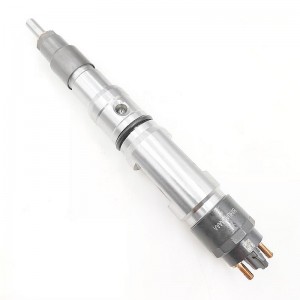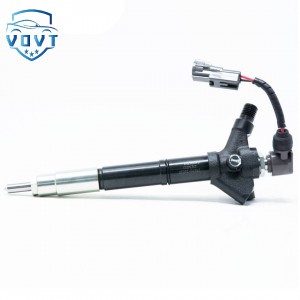High Quality Auto Parts Diesel Fuel Injector 23670-0E060 Fuel Injector Engine Parts
Products Description
| Reference. Codes | 23670-0E060 |
| Application | / |
| MOQ | 4PCS |
| Certification | ISO9001 |
| Place of Origin | China |
| Packaging | Neutral packing |
| Quality Control | 100% tested before shipment |
| Lead time | 7~15 working days |
| Payment | T/T, L/C, Western Union, Money Gram, Paypal, Ali pay, Wechat |
Influence of Sintering Process Parameters of Powder Metallurgy Materials on the Sealing Performance of Fuel Injector Valve Seats
Abstract
The valve seat of a fuel injector plays a crucial role in ensuring effective sealing between the needle valve and the injector body, directly influencing fuel injection pressure, leakage rate, and overall system efficiency. In recent years, powder metallurgy (PM) has been increasingly adopted in valve seat manufacturing due to its advantages in near-net shaping, cost-effectiveness, and material customization. However, the sintering process parameters—including temperature, time, atmosphere, and pressure—strongly affect the microstructure and sealing performance of PM valve seats. This study investigates the relationship between sintering parameters and the sealing characteristics of powder metallurgy valve seat materials.
A series of valve seat samples were fabricated under varying sintering conditions using iron-based alloys with controlled additions of nickel and molybdenum. Microstructural analysis revealed that higher sintering temperatures (above 1150 °C) significantly enhanced grain bonding and densification, reducing internal porosity and improving the sealing contact surface. Conversely, excessive sintering duration led to grain coarsening and surface distortion, negatively impacting dimensional stability and sealing uniformity.
The experimental results demonstrated that the optimal sintering window achieved a density above 7.3 g/cm³, surface roughness below Ra = 0.8 μm, and a leakage rate reduction of more than 25% compared with conventionally sintered samples. Finite element analysis (FEA) of the valve–seat contact confirmed that improved densification and uniform microstructure distribution enhanced contact stress uniformity, thereby strengthening the sealing capability under high-pressure cyclic loading.
Furthermore, the study analyzed the effect of sintering atmosphere (vacuum vs. hydrogen) on oxide removal and carbon loss. Hydrogen sintering effectively reduced oxide inclusions and improved inter-particle diffusion, contributing to better sealing and fatigue resistance.
In conclusion, the sealing performance of powder metallurgy valve seats is highly sensitive to sintering parameters. Proper optimization of temperature–time coupling and atmosphere control can significantly improve material density, surface integrity, and long-term durability. The findings provide theoretical guidance for developing high-precision, high-reliability fuel injector components using advanced powder metallurgy techniques.

























